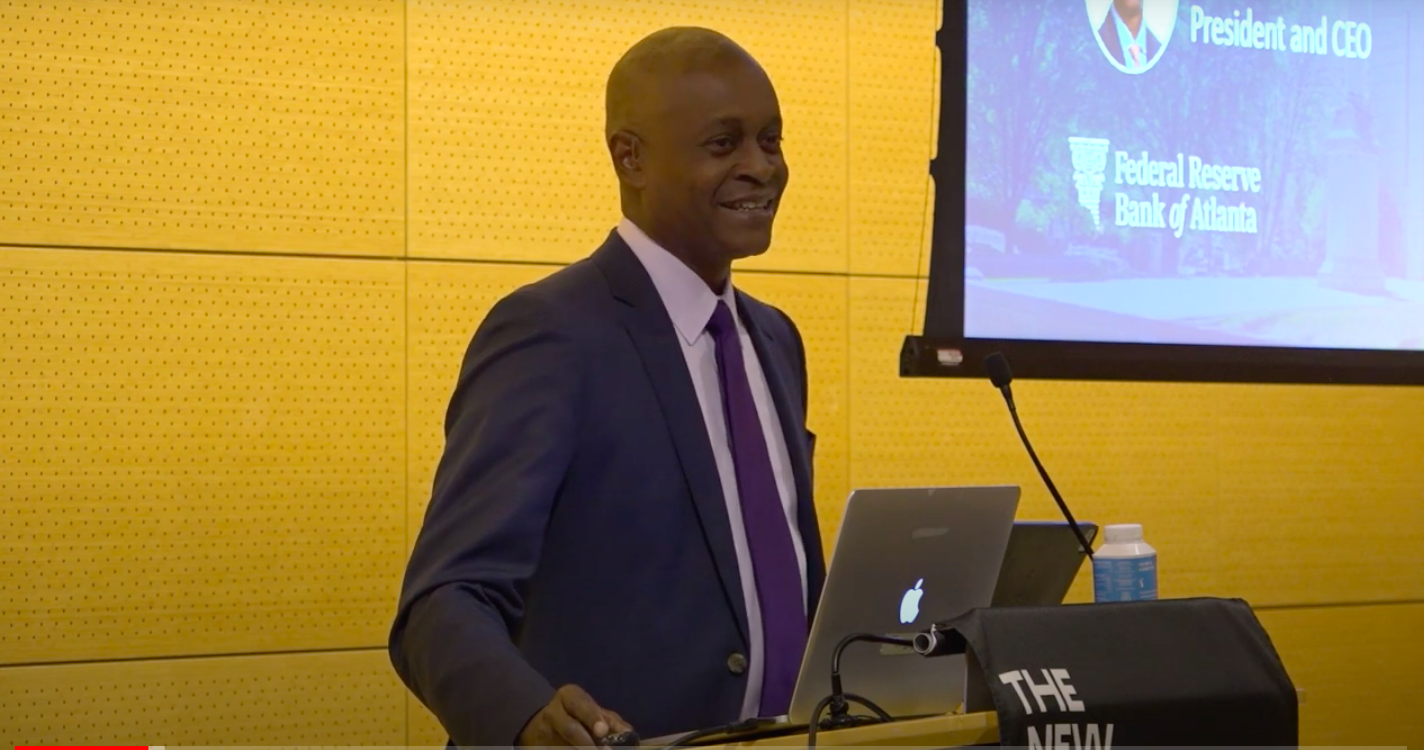
NSSR’s 2023 Schwartz Lecture Addresses the Inequalities of Work and Wealth
“Expanding economic opportunity is a defining issue of our time. Because of outright discrimination in some cases and unintended consequences in others, our nation has long squandered too much talent and creativity. We must change that to continue thriving as a people and an economy,” said Raphael Bostic, president and CEO of the Federal Reserve Bank of Atlanta and one of the country’s most creative policy economists, in the 2023 Schwartz Lecture. He made this remark in a lecture titled “Work and Wealth Inequality: Policy Responses and Causes,”part of Schwartz Lecture series, an annual event presented by The New School for Social Research’s Economics department that features major public figures in economic policy.
The Federal Reserve Bank’s mandate from Congress is to pursue price stability and maximum employment, creating an environment in which everyone who wants a job can find one. Bostic encouraged an expansive view of the mandate that he calls sustained maximum employment. “Employment opportunities tend to be constrained by a person’s education or training, experience, the availability of jobs where they live, and so on. But over time, these circumstances can change. People may go to school, get training, and gain new skills. In the longer run, then, sustained maximum employment means everyone has the opportunity to get not just any job but gainful employment in a job that is consistent with their full potential. To achieve sustainable maximum employment, we must foster an economy in which everyone can maximize their human capital and apply their talents to their highest and best use to earn family-supporting incomes. In short, sustainable maximum employment is a more inclusive objective.”
The Atlanta Fed has connected with policymakers to find ways to increase economic mobility and resilience in the communities they serve. Bostic noted that solutions can be found outside of its purview, such as increased educational opportunities. “To be sure, monetary policy is not solely or perhaps even mainly responsible for enhancing employment outcomes for disadvantaged workers. A notable factor of late is progress in educational attainment. Consider college degree attainment rates. You no doubt know that African Americans and Hispanic Americans have long lagged the general population in terms of earning college degrees. Well, between 2010 and 2020, gains in the share of African Americans and Hispanic Americans with college degrees far outpaced those for the general population. This has direct implications for unemployment. High school graduates who don’t attend college experience substantially higher unemployment rates than do workers with degrees. I don’t mean to suggest that every person should attend college. There are certainly other pathways to better labor market outcomes, such as training and apprenticeships. In fact, the Atlanta Fed’s Opportunity Occupations Monitor highlights many good jobs that one can attain through those routes. But college is a proven pathway that frequently leads to economic self-sufficiency and wealth building.”
Following Bostic’s speech, a panel discussion moderated by Teresa Ghilarducci, Irene and Bernard L. Schwartz Professor of Economics and Policy Analysis, brought to light a variety of opinions on the question: Given the weight of inequality in our society, is the Fed doing enough?
According to Darrick Hamilton, Henry Cohen Professor of Economics and Urban Policy, University Professor, and founding director of the Institute on Race, Power and Political Economy, “There’s no question there are constraints in what the Fed can do, particularly relative to the federal government with regards to addressing inequality. But I think the normative perspective of price stability is overemphasized at the expense of ensuring we have greater inclusion in our economy.” He also emphasized the role of training and education, stating, “Let’s add the context of skill as an input to providing mobility and economic inclusion, particularly across race. Without a doubt, more education leads to better jobs, better income. I’m not so sure about higher wealth—I think capital is the foundation for wealth—but without a doubt more education is good. It’s good in and of itself. We want to live in a society where people have access to education in and of itself as an outcome.”
Tony James, co-founder of the Partnership for Education Advancement, felt that the Federal Reserve’s two main goals, achieving full employment and keeping inflation under control, needed to continue to be its primary focus. “That’s its mandate, and I think it’s dangerous for the Fed to try to do too much outside that mandate. So it has at least one hand tied behind its back in addressing inequality, maybe two.” He emphasized the important role employment plays in addressing inequality, adding, “I’m a believer in getting people on the career ladder, where they develop more skills. It’s not just income and taxes but also dignity and other things that are critically important.”
Kate Bahn, PhD Economics ’15, research director at WorkRise at the Urban Institute, felt that it is “huge that the Fed is saying inequality is bad for the economy. That’s huge in economics; that goes against a lot of what we’re taught in economics. Inequality is not some incentive for people to work harder and move up. It’s actually a constraint and a barrier for people to be able to do that. I think that framework alone is important.” Speaking to the role education can play in addressing wealth inequality, she said, “We do know that those with higher education levels are more likely to be employed, but what kinds of jobs are they in? I care about job quality, worker mobility, and what jobs are they getting into. Education that costs a lot can actually be an inhibitor to mobility if people are stuck in debt from trying to get higher levels of education. When trying to achieve this dual mandate, we need a critical lens on how full employment is achieved.”